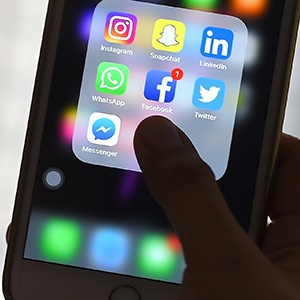
The invocation of freedom of speech to justify any and every form of expression on social media simply cannot be justified unless we have no interest in the preservation of democracy, writes Serjeant at the Bar.
The recent hate crimes in El Paso, Texas and Dayton, Ohio have again prompted discussion about the role of social media in perpetuating the climate in which such ghastly acts take place. The proclaimed advantage of the internet and with it the variety of social media that the digital age has spawned was that it would promote democracy. Free speech would flourish, free from the fetters of regimes determined to cut off its flow and, in addition, access to large resources would no longer be needed by ordinary people to promote and perpetuate a deliberative democracy.
This claim has now been flipped; the question is whether the widespread employment of social media is not now a considerable threat to democracy. Donald Trump's daily tweets which are textbook cases of "othering" and, for example, Cambridge Analytica which notoriously helped perpetuate a climate of xenophobia in both the United Kingdom and the United States are clear examples of the abuse of this technology to ensure the reduction of democracy.
South Africa is equally in the grip of this phenomenon. Recently, the distinguished journalist (certainly so rated among those who treasure democracy) Ferial Haffajee wrote as follows about her experience:
"Every morning, I pick up my phone and check WhatsApp messages. Then, I open my Twitter feed. 'Bitch!' reads a response to something I've posted or written or reported. I block. 'Cunt,' reads another. Block. 'Racist, go back home,' says another.
'I will smack you so hard, you won't know your name,' I type. And then block.
READ: Helen Zille – A Sanef win against the EFF will be a major blow to media freedom
"Online abuse has become so commonplace that taking it in and blocking is part of the daily routine now. Just occasionally, you have to fight back.
"When Donald Trump told four US congresswomen to go back to where they came from a few weeks ago, igniting a fusillade of stories from people who had been told so, I thought about writing on the black digital Trumps in South Africa. 'Go home' and 'Go back to India if you don't like it here,' are quite regular taunts on Twitter. As Raymond Suttner has written… this othering of people delegitimises them, to create hate.
"Then, a former colleague (and a friend, I thought) … started his infamous thread numbering and naming a group of journalists he called the 'Cabal' who are, by his judgment, part of a narrative of disinformation — himself deliberately misleading the public."
Significantly in her article, Haffajee admits that "I had heard via the family and other grapevines that a group of journalists who had written about the Guptas were under surveillance and were a target, but I had given it little thought".
That is the problem – until the effect of social media hits personally or a person influenced by this hate filled garbage goes on a murderous rampage as occurred in El Paso or Dayton, most of us carry on with the view that at best social media expands the terrain of speech and hence democratic deliberation. In this way we forget or allow by omission the perpetuation of a discourse on social media which others, intimidates, and erodes the dignity of anyone with whom the internet trolls disagree and then target with their venom.
Reflecting on this problem, columnist to the Washington Post Anne Applebaum has written recently about previous challenges posed by the advance of technology: "Radio's early stars included Adolf Hitler and Joseph Stalin: The technology could clearly be used to provoke anger and violence. But was there a way to marshal it for the purposes of democracy instead? One answer was the British Broadcasting Corp., the BBC, which was designed from the beginning to reach all parts of the country, to 'inform, educate and entertain' and to join people together, not in a single set of opinions but in the kind of single national conversation that made democracy possible. Another set of answers was found in the United States, where journalists accepted a regulatory framework, a set of rules about libel law and a public process that determined who could get a radio license."
The key question in the digital age is to find comparable forms of response so that the trolling and the professional manipulators of digital tools such as Cambridge Analytica do not exploit a fundamental constitutional value, being freedom of expression, as a weapon to destroy the very conditions which promote democracy.
This exploitation of social media for political projects which are in essence populist programmes, whether they use left or right-wing language, can only threaten the very essence of democracy, particularly in a country like South Africa which is still building the kind of social practice that can sustain constitutional democracy.
In summary, the invocation of freedom of speech to justify any and every form of expression on social media simply cannot be justified unless we have no interest in the preservation of democracy. We can start by calling this kind of trolling what it is: acts of proto fascism. From here we need to construct the kind of 21st century response to the digital age as was the case when radio became the vogue almost 100 years ago.
- Serjeant at the Bar is a senior legal practitioner with a special interest in constitutional law.
** Want to respond to the columnist? Send your letter or article to voices@news24.com with your name, profile picture, contact details and location. We encourage a diversity of voices and views in our readers' submissions and reserve the right not to publish any and all submissions received.
Disclaimer: News24 encourages freedom of speech and the expression of diverse views. The views of columnists published on News24 are therefore their own and do not necessarily represent the views of News24.




 Publications
Publications
 Partners
Partners























